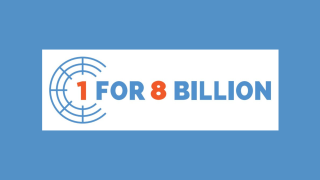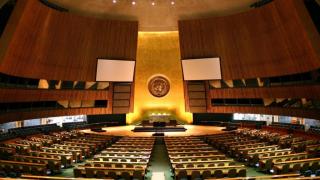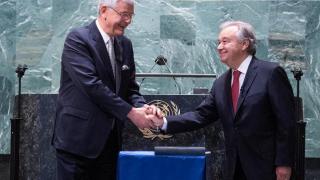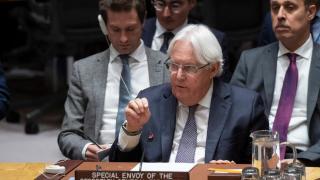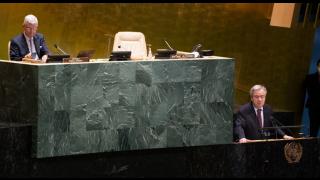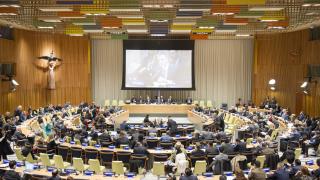
For the first time in the history of the United Nations, candidates vying to be the next Secretary-General faced questions from member states and civil society in webcast hearings at the General Assembly. Hailed by media worldwide—and described by the President of the General Assembly—as a consequence of the two-year long campaigning efforts of UNA-UK's campaign, 1 for 7 Billion, the hearings indicated a major departure from the secretive selection process that used to take place behind closed doors.
From 12-14 April, 1 for 7 Billion has been providing live coverage and commentary on the hearings, which saw the nine candidates face UN member states. Below, we summarise where candidates stand on our main campaign priorities.
Single term
One of 1 for 7 Billion’s main reform proposals is for the next UN leader to be appointed for a single, non-renewable term of office, possibly for seven years. We believe that this would give the Secretary-General the political space that she or he needs to make crucial decisions in moments of crisis, rather than being beholden to the will of powerful states who currently dominate the re-appointment process. Click here to read our policy paper on this issue.
While three Secretary-General candidates – Antonio Guterres (Portugal), Vuk Jeremić (Serbia), and Helen Clark (New Zealand)– were asked for their views on a single term, only Clark provided an answer. Clark responded that while she sees “the case for a single term,” she is “relaxed” about the issue, and believes that it should be left in the hands of member states to decide.
.@jeremic_vuk claims to be a reformer- if you want the status quo, "I'm not your guy" #NextSG. But does he support reform of term length?
— 1 for 7 Billion (@1for7billion) April 14, 2016
1 for 7 Billion was particularly disappointed that Jeremić evaded this question, which was put to him by the representative from Costa Rica. Jeremić had previously expressed public support for a single term at a conference in Paris earlier this year, before his candidacy had been confirmed.
Notably, although Vesna Pusić (Croatia) was not asked this question during her hearing, she expressed her support for a single term in a response to 1 for 7 Billion’s letter.
Senior appointments
1 for 7 Billion has advocated for the next Secretary-General to be the best person for the job, irrespective of region or gender. In turn, we believe that the next UN leader should appoint senior officials on the basis of merit, and should not promise key high-level positions to certain member states in exchange for support.
Several candidates acknowledged that merit should be the main consideration in UN appointments. Asked to elaborate on how they would address “geographic imbalances” in the UN, Danilo Türk (Slovenia), Clark, Jeremić and Pusić emphasised merit-basis as the primary factor. Türk was the first candidate to openly express this view, responding to whether he would improve representation of small island states in the Secretariat. Türk’s reply: "I say, come with good candidates!” Guterres emphasised the need for “clear and transparent criteria for Secretariat appointments, as well as a "roadmap" to achieve gender parity and geographic balance. Jeremić, while acknowledging his desire for regional representation, stated that ultimately, it should be the "best man or woman for the job wherever we go, whatever we do".
Some candidates, including Srgjan Kerim (Macedonia) and Igor Lukšić (Montenegro), showed a preference for the informal principle of 'regional rotation' for many UN positions. Lukšić pledged that if he were appointed Secretary-General, his deputy would come from the southern hemisphere. Kerim noted that the Eastern European group believes it is its "turn" to be Secretary-General, and stated that regional rotation has always been important for the UN. Irina Bokova (Bulgaria) also appeared to prioritise regional representation, stating that she had abided by this principle as Director-General of UNESCO.
If #NextSG, Gherman would recruit staff based on merit, considering gender. No comment on issue of backroom deals in appointing staff.
— 1 for 7 Billion (@1for7billion) April 13, 2016
Gender representation was also a major concern during the meetings, with each of the candidates expressing a commitment to gender equality when making appointments. While Natalia Gherman (Moldova) stated that she would prioritize women’s engagement as Secretary-General, Bokova remarked that “the 21st century has to be the century of a true commitment to equality between the sexes”. Pusić emphasized that ensuring gender parity when making appointments is "not only right, it's smart."
Lukšić, Jeremić, and Kerim proposed that the appointment of a male Secretary-General should be accompanied by the appointment of a female Deputy-Secretary-General. Kerim and Jeremić made bold claims as to the gender ratios of their staff. Kerim promised that the Secretariat’s gender ratio would improve to 60-40 (men to women) if he was Secretary-General, while Jeremić insisted that he would ensure that half of Under-Secretaries-General were women from “day one".
However, the candidates were disappointingly vague as to how they would guarantee their independence as Secretary-General, particularly with regard to senior Secretariat appointments. Our campaign encourages candidates to consider specific measures to this end—such as committing to serve only a single term—in order to ensure that they can effectively serve as the next Secretary-General.
Civil Society Participation
As a civil society campaign, 1 for 7 Billion is deeply committed to ensuring that civil society voices are heard at the United Nations. Throughout the hearings, the candidates were asked for their views on how civil society should engage with the UN, and how this engagement could be protected.
Great to have questions from #civilsociety at my session w/ @UN General Assembly y/day! #Helen4SG @1for7billion https://t.co/GYZoSZrZXt
— Helen Clark (@Helen4SG) April 15, 2016
Türk called for new forms of civil society cooperation with the UN, and stated that he would hold consultations early in his tenure as Secretary-General to identify how to progress in this area. Gherman focused on the importance of partnerships with civil society, as well as the private sector, in implementing the Sustainable Development Goals.
In this vein, several of the candidates highlighted their own experiences working with, or as a part of, civil society. Guterres noted that he supported civil society access in his role as UN High Commissioner for Refugees, and Kerim stated that as 62nd President of the GA he had insisted that civil society be "part and parcel" of the UN's work. Highlighting her own experiences as a civil society representative, Pusić emphasized that civil society should be involved in defining the UN’s agenda. Jeremić mentioned that he is currently head of a civil society organisation, but also noted that first and foremost he would work with member states.
Campaign budget
Interestingly, during the media stakeouts, several candidates were questioned about their campaign funding. Guterres explained that the Portuguese government funded his travel, as well as other logistical expenses. Jeremić stated that he intended to fundraise rather than accept money from governments, and added that he would disclose the sources of this funding.
.@1for7billion @Global_Memo So far I spent 7514€. Limit is 40.000€.
— Danilo Türk (@_DaniloTurk) April 14, 2016
Kerim offered an estimate of his campaign budget, explaining that the Macedonian government had spent 60,000 euros to date, and would contribute an additional 40,000. He noted that he would also personally contribute to his campaign. In a nod to greater transparency, Lukšić committed to publishing his campaign budget. UNA-UK and 1 for 7 Billion view this as a positive development, and hopes that all candidates will consider taking similar steps.
Photo: General Assembly Holds Informal Dialogues with Candidates for Next Secretary-General. Copyright: UN Photo/Rick Bajornas

